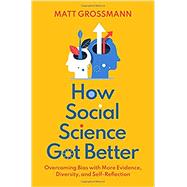
How Social Science Got Better Overcoming Bias with More Evidence, Diversity, and Self-Reflection
by Grossmann, MattBuy New
Buy Used
Rent Book
Rent Digital
How Marketplace Works:
- This item is offered by an independent seller and not shipped from our warehouse
- Item details like edition and cover design may differ from our description; see seller's comments before ordering.
- Sellers much confirm and ship within two business days; otherwise, the order will be cancelled and refunded.
- Marketplace purchases cannot be returned to eCampus.com. Contact the seller directly for inquiries; if no response within two days, contact customer service.
- Additional shipping costs apply to Marketplace purchases. Review shipping costs at checkout.
Summary
In response to these criticisms, Matt Grossmann, in How Social Science Got Better, provides a robust defense of the current state of the social sciences. Applying insights from the philosophy, history, and sociology of science and providing new data on research trends and scholarly views, he argues that, far from crisis, social science is undergoing an unparalleled renaissance of ever-broader understanding and application. According to Grossmann, social science research today has never been more relevant, rigorous, or self-reflective because scholars have a much better idea of their blind spots and biases. He highlights how scholars now closely analyze the impact of racial, gender, geographic, methodological, political, and ideological differences on research questions; how the incentives of academia influence our research practices; and how universal human desires to avoid uncomfortable truths and easily solve problems affect our conclusions. Though misaligned incentive structures of course remain, a messy, collective deliberation across the research community has shifted us into an unprecedented age of theoretical diversity, open and connected data, and public scholarship.
Grossmann's wide-ranging account of current trends will necessarily force the academy's many critics to rethink their lazy critiques and instead acknowledge the path-breaking advances occurring in the social sciences today.
Author Biography
Matt Grossmann is Director of the Institute for Public Policy and Social Research and Professor of Political Science at Michigan State University. He is also Senior Fellow at the Niskanen Center and a Contributor at FiveThirtyEight. He has published analysis in The New York Times, The Washington Post, and Politico and hosts the Science of Politics podcast. He is the author or coauthor of many books, including Asymmetric Politics, Red State Blues, The Not-So-Special Interests, Artists of the Possible, and Campaigns & Elections, as well as dozens of journal articles.
An electronic version of this book is available through VitalSource.
This book is viewable on PC, Mac, iPhone, iPad, iPod Touch, and most smartphones.
By purchasing, you will be able to view this book online, as well as download it, for the chosen number of days.
Digital License
You are licensing a digital product for a set duration. Durations are set forth in the product description, with "Lifetime" typically meaning five (5) years of online access and permanent download to a supported device. All licenses are non-transferable.
More details can be found here.
A downloadable version of this book is available through the eCampus Reader or compatible Adobe readers.
Applications are available on iOS, Android, PC, Mac, and Windows Mobile platforms.
Please view the compatibility matrix prior to purchase.
